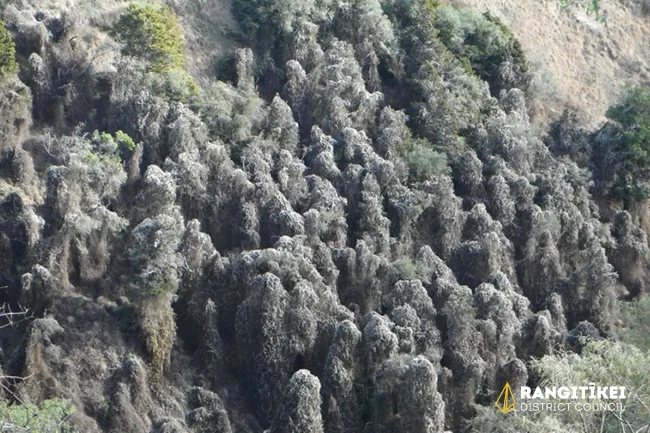New Zealand's first release of gall mite to tame Old Man’s beard starts in our District
August 12, 2021

Horizons Regional Council is set to introduce the leaf-galling mite Aceria vitalbae in a New Zealand-first bid to control the highly invasive pest plant, old man’s beard (OMB).
On Thursday 19 August a small number of plants, shipped from Manaaki Whenua - Landcare Research’s Lincoln campus, that have been ‘infected’ with the gall mite will be planted in the Taihape area.
Horizons Environmental Programme Coordinator Craig Davey says old man’s beard is a serious problem across much of our region.
“It’s a fast growing competitive vine which establishes rapidly and spreads easily. OMB smothers all but the tallest trees, replacing indigenous species and forming dense carpets in the understory.”
“Implementing an effective biocontrol agent for old man’s beard will help to slow the spread and impact of this highly invasive and difficult to control species”, says Mr Davey.
Horizons applied to the Environmental Protection Authority (EPA) to introduce the gall mite on behalf of the National Biocontrol Collective, comprising of 14 regional councils and the Department of Conservation.
The application was approved in 2018 and shortly after old man’s beard plants infected with mites were sourced from Serbia by Manaaki Whenua - Landcare Research.
Aceria vitalbae is only 1mm long and has no method of dispersal. The gall mite works by forming galls in the ‘host’ plant, forcing the host to redirect resources to the galls, which in turn reduces the host’s growth rate and can cause shoots to die back.
Horizons spends more than $500,000 annually trying to eradicate old man’s beard. Both ground control and targeted helicopter spraying of the most suitable herbicide can cost up to $1,500 per hectare.
“Old man's beard requires intensive, manual effort to control and requires follow-up maintenance control. While herbicides can be effective, this method is limited because herbicides can also harm the host vegetation.”
“The use of a biological control like the gall mite is not only more cost effective, it allows nature to promote change. We like to think of it restoring some sense of balance” says Mr Davey.
Horizons has engaged with local iwi to appropriately introduce this biological control into the Taihape area. And once established, Horizons are keen to involve tangata whenua in monitoring and care of the sites.
“This is early days, and we need to allow for the mites to mature through their life cycle, but this introduction of the gall mite gives us immense hope in the fight against a pest like old man’s beard.” says Mr Davey.
